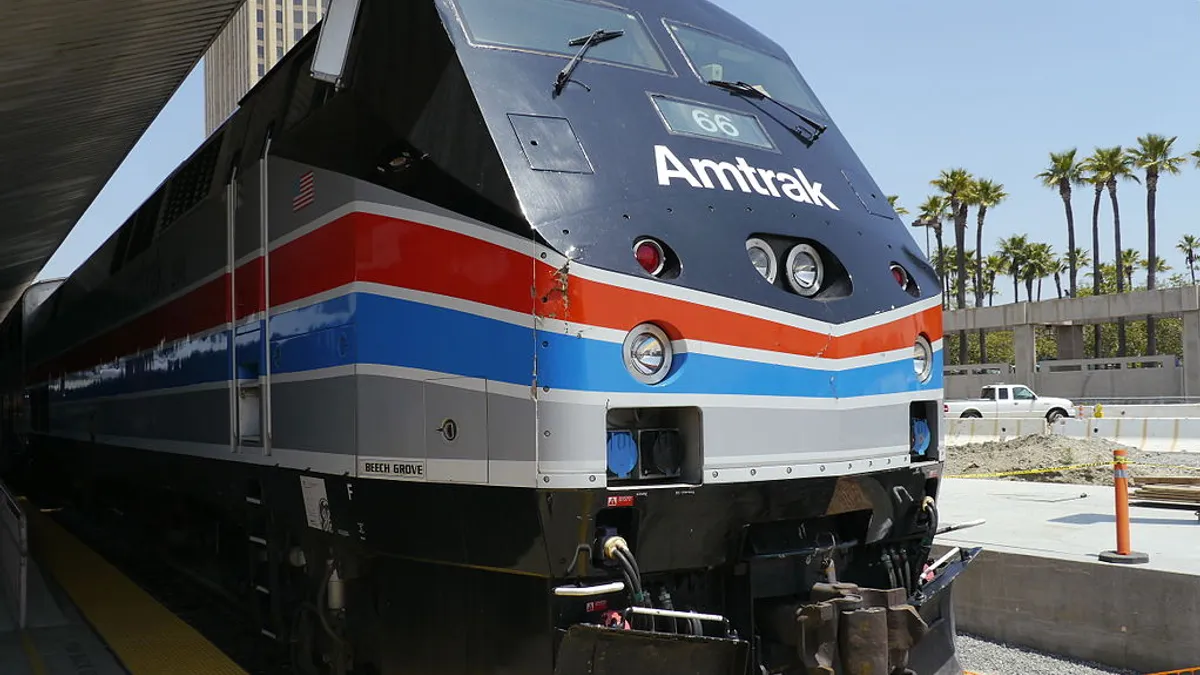Dive Brief:
- Amtrak published its first-ever Host Railroad Performance Report Card this week — grading six Class I railroads' networks based on scheduling data and the frequency of their delays, slamming the performance of two of the freight railroads' operations in particular.
- Only Canadian Pacific and BNSF received a B+ or higher as a host for Amtrak. Union Pacific (B-) and CSX (C) were mid-tier, averaging over 40 minutes of delays to Amtrak schedules due to their own operations. Norfolk Southern and Canadian National received failing grades as hosts, due to frequent delays over 90 minutes.
- By law, freight railroads must prioritize Amtrak trains on their networks, an old rule that simultaneously freed freight carriers from public transport responsibilities.
Dive Insight:
This is the first year Amtrak publishes such a report, and it may serve as a proxy to compare freight carriers' excellence in managing their own schedules.
"Decisions by freight companies to prioritize their trains over passengers often occur when freight trains are operating late, short on crews, etc.," Amtrak wrote in its FAQ. "Undisciplined freight companies may operate freight trains many hours ahead of or behind schedule, or with no schedule at all. So a poor grade may also indicate that the host is doing an ineffective job of running their freight operations, which causes Amtrak passengers to suffer."
In other words, if a freight railroad is making a potentially illegal choice by prioritizing its own train over a passenger train, Amtrak argues its scheduling situation must be dire. At the same time, the passenger railroad acknowledges freight carriers tend to break this rule with impunity, as the last case on the issue occurred "40 years ago!"
Amtrak is far from unbiased, however, as it calls out its freight partners for what it considers poor management.
Less than two years ago, the railroad industry was engulfed in a battle over rail preference. While the Surface Transportation Board (STB) rebuked requests to give freight trains priority in 2016, the debate over what should be the rule remains very much alive. The passenger railroad has a deep-seated interest in preserving the status quo and publicly pointed out the instances where it sees freight railroads abstaining from their legal duties.
This report card was published at an opportune time, too. The STB recently sent a letter to the six top freight railroads, demanding a report on their service conditions after it received two scathing letters from shippers' associations. With the CSX troubles as a backdrop, the regulator's reasons to doubt the U.S. freight network's efficiency are only piling up.
"The increase in service problems over the past 12 months has brought to the forefront long latent concerns over the lack of viable options when poor rail service jeopardizes the operations of TFI members," The Fertilizer Institute wrote in its letter to the STB. "We advocate a system where railroads are encouraged to proactively work to prevent service disruptions before they happen."














